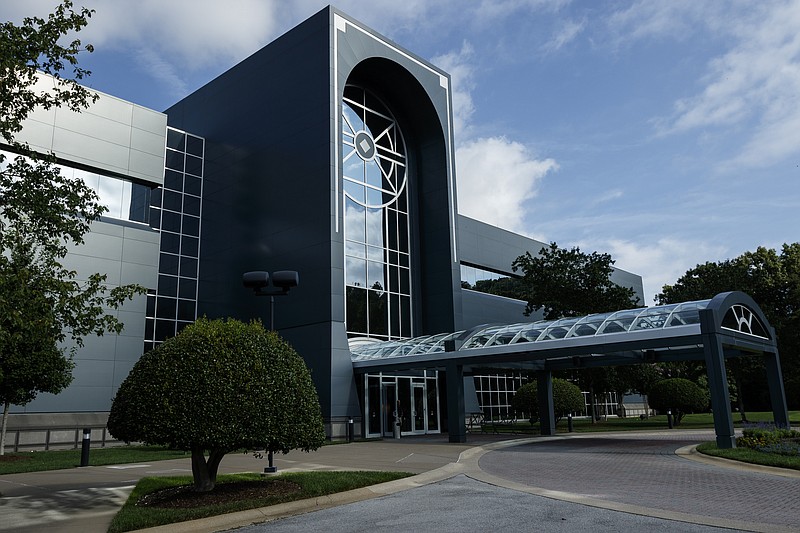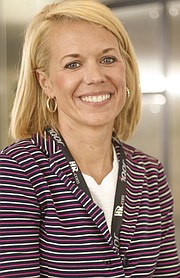In March 2020, in a matter of only a few days, schools, churches, restaurants and offices of all sizes were emptied out as employers sent their workers home as the COVID-19 outbreak worsened.
Two years later, most people have finally resumed more normal lives. But office work at some of Chattanooga's biggest employers will never be the same.
Forced to work remotely to limit the potential spread of the virus, employees quickly adapted to doing their work at home and, in many instances, found that they were more productive and liked not having to make the daily trek to the office.
"We have been extremely flexible during this time, and we've proven that we can be successful with over 70% of our people working from home," Amanda Thompson, chief people officer with U.S. Xpress Enterprises, said in a telephone interview.
After months of discussion about the changes and talk about bringing workers back, Thompson said U.S. Xpress finally decided this spring to continue long-term remote work for most of the 1,400 workers at its headquarters staff in Chattanooga.
"Our offices are open and available for work, and some of our employees still must work on site," Thompson said. "But for those who have been working out of their house, we have chosen a more permanent remote status."
U.S. Xpress Enterprises, one of the nation's biggest long-haul trucking companies with nearly 10,000 drivers and other workers nationwide, is among several of Chattanooga's biggest office employers that have decided to permanently allow much of their workforce to do their jobs remotely following the pandemic.
Lower turnover
At BlueCross BlueShield of Tennessee, more than 85% of the company's more than 6,000 employees are now working under an arrangement in which most of their work is done at home, but workers can come into the office if they choose. Roy Vaughn, a senior vice president at BlueCross, said surveys showed 94% of employees thought BlueCross's approach, called FlexWork, suits them.
"We've seen that this commitment to flexibility helps us attract and retain top talent now." - Roy Vaughn, senior vice president of BlueCross BlueShield of Tennessee
"We believe flexibility is real currency in today's world as our employees seek to integrate work into their personal lives," he said in an emailed statement. "We've experienced turnover at much lower rates than what we've seen reported with other major employers, and we attribute that partially to our flexible work model that offers the option to work either in-office or remotely a majority of the time."
Employees are invited to come to the BlueCross headquarters atop Cameron Hill for frequent meetings and in-person connections with colleagues and managers, but much of the daily work for most employees can be done in their homes.
"We've seen that this commitment to flexibility helps us attract and retain top talent now," Vaughn said. "We've listened to what employees have told us they want, and it shows."
Thompson also said U.S. Xpress is having more success with recruitment and retention by being more flexible in its work arrangements. To help build the company culture and promote interaction among workers, Thompson said U.S. Xpress is planning a series of occasional summits held in person at the corporate headquarters "so we can create the atmosphere to try to ensure that we are engaging our folks and they are learning from one another."
While workers who like coming to the office may choose to do so, most of the headquarters staff will work most of the time from their homes.
Hybrid exploration
At the Tennessee Valley Authority, most office workers continue to work at home, at least some of the time, as the utility undergoes a six-month "hybrid exploration." While plant and maintenance workers have stayed on the job through the pandemic at TVA, a majority of TVA's 10,000 employees initially shifted to at-home work, and a majority of the office workers at TVA are still working remotely, at least some of the time.
"Frankly, in many sectors of our workforce, we've actually seen increases in our productivity with remote working." - TVA President Jeff Lyash
"I think you're going to see expectations that employees have flexibility," TVA Chief Operating Officer Don Moul told the TVA board in February. "The market for employees has become increasingly competitive, and flexibility is something that everyone values in their work-life balance. "
TVA President Jeff Lyash said businesses like TVA have learned how to better operate and supervise staff working from home.
"We've made leaps in the way we apply technology and how we use our IT system and incorporate video into our meeting formats," Lyash said. "Frankly, in many sectors of our workforce, we've actually seen increases in our productivity with remote working. So rather than just return to the workplace as it was before the pandemic, we've tried to build a vision of the future that will capture all of those lessons and advantages we've seen and leverage that for productivity, efficiency and lower cost in the future. "
Striking a balance
At Unum, company spokeswoman Natalie Godwin said the insurance giant also is now operating as a hybrid company. Each week, about 45% of Unum's more than 2,500 local employees come into the company's downtown headquarters.
"We believe in the benefits of in-person interactions and the flexibility of remote working," she said in an emailed statement. "It's about striking the right balance to support our customers and employees. This flexible work model aligns with our agile and inclusive culture."
Godwin said Unum will continue to monitor the pandemic and adjust its approach as needed.
While most major office companies are employing a mix of in-person and remote work for different jobs, Cigna Healthcare opted last year to move all of its 450-employee staff in East Brainerd to remote jobs. Cigna decide to permanently close its 98,652-square-foot office and allow the call center and support staff work to be done at home by its employees. The vacated 95-acre campus is now being considered as a site for a new Hamilton County school.
Smaller spaces
Derek English, president of the Greater Chattanooga Realtors association, said the move to remote work by office workers weakened the commercial real estate mark in Chattanooga with fewer workers going to the office or eating at nearby restaurants. But in a report last month, English said the overall market for commercial real estate, while much slower than the red hot residential market, is showing signs of growth again.
"In March 2020, many businesses closed temporarily, and unfortunately, many of those closures turned into permanent ones," English said. "This pattern led to an uncertain time for the commercial real estate market. However, there are hopeful signs that the national picture for commercial real estate is starting to adapt to these new circumstances."
A recent survey by the National Association of Realtors found that 65% of respondents reported more businesses adopting a hybrid work schedule and 63% of the real estate owners contacted reported more businesses in their local markets leasing smaller spaces compared to the pre-pandemic level.
Contact Dave Flessner at dflessner@timesfreepress.com or at 423-757-6340. Follow him on Twitter @dflessner1.

